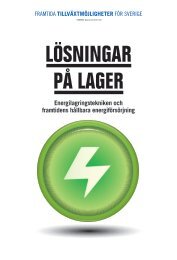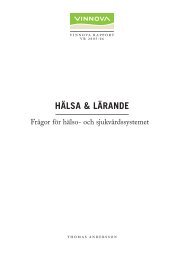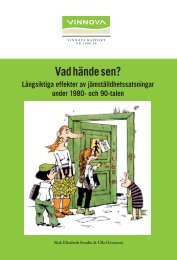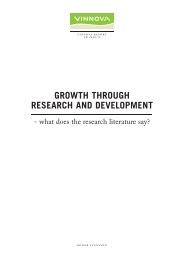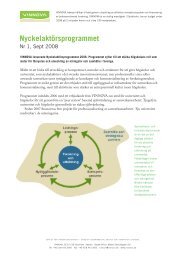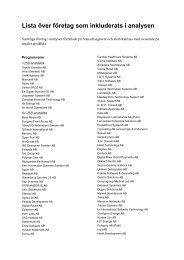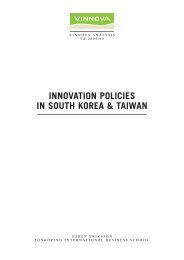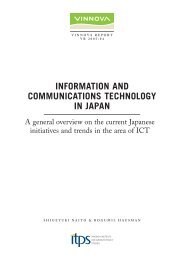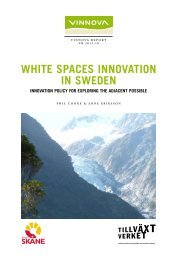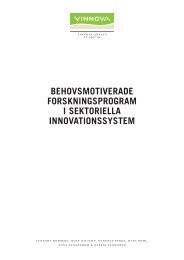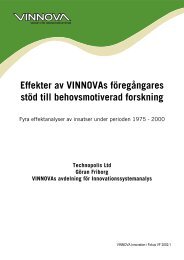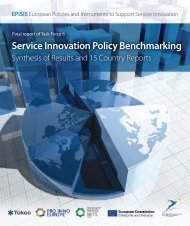Free download - Vinnova
Free download - Vinnova
Free download - Vinnova
Create successful ePaper yourself
Turn your PDF publications into a flip-book with our unique Google optimized e-Paper software.
INTERVIEW<br />
Smooth cooperation<br />
at ABB<br />
No country with such a small population<br />
has produced so many complex<br />
products.<br />
– It’s not that we are smarter than<br />
anybody else. Sweden’s advantage<br />
is that we have long experience of<br />
developing technical systems, says<br />
Charlotte Brogren, Vice President of<br />
Technology at ABB Robotics.<br />
– But competition in a globalized<br />
world is becoming keener all the time.<br />
That is why Sweden must concentrate<br />
on areas where we already possess<br />
advanced know-how.<br />
ABB’s product portfolio is full of robots<br />
and power transmission products.<br />
Superficially, it looks like old technology,<br />
but the customers’ constantly<br />
changing wishes create an environment<br />
of continuous change. In order<br />
to succeed, ABB is engaged in close<br />
cooperation with researchers at many<br />
universities all over the world.<br />
– It is thanks to our contacts with<br />
The Linköping and Lund universities<br />
of technology that we are successful<br />
robot manufacturers today.<br />
CORE AREAS<br />
According to Charlotte Brogren, cooperation<br />
with Swedish researchers is<br />
smooth, direct and unbureaucratic. But<br />
relations with some foreign universities<br />
are more complicated, and regulations<br />
make it more difficult to conduct joint<br />
research projects with them.<br />
Although ABB only sells 3 per cent of<br />
its products in Sweden, almost a third<br />
of all research is done in this country.<br />
– We continuously evaluate where<br />
we can get the best value for our<br />
research grants. So far, our Swedish<br />
partners hold their own. But we cannot<br />
live on our past successes. Sweden’s<br />
future growth lies in our core areas,<br />
automation and power transmission,<br />
but also in the telecom, vehicle and<br />
process industries. All these areas<br />
require broad experience of technically<br />
complicated system solutions.<br />
about processes and production equipment<br />
to finished applications. Apart from<br />
having a market worth many millions of<br />
euros for its thin film processes using<br />
MAX, the company also intends to sell<br />
complete production plants.<br />
A new superglass<br />
Innovations are not always planned.<br />
Diamorph in Stockholm started with a<br />
failed experiment. This gave rise to a new<br />
superglass that is extremely hard, impactresistant<br />
and with a refraction index on a<br />
par with diamonds. Saeid Esmaeilzadeh<br />
is a researcher at the Department of Inorganic<br />
Chemistry at Stockholm University.<br />
Two years ago he was studying silicon<br />
nitride ceramics. Silicon nitride and<br />
additives were melted in his experiments<br />
at high temperature and were then set to<br />
cool at a controlled rate so that crystals<br />
were formed from the melt. But one<br />
night something unforeseen occurred.<br />
They usually work with melts at a<br />
temperature of 1,500 to 2,000° C and<br />
always keep the coolant connected to<br />
the kilns. In the middle of the night the<br />
cooling system broke down, the kiln was<br />
automatically shut down and the melt<br />
cooled much faster than usual. When<br />
Saeid examined the sample it was not<br />
crystalline but glass, with very interesting<br />
properties. It was the hardest silicate<br />
glass that has ever been produced. In<br />
addition, it has an extremely high refraction<br />
index, virtually the same as that<br />
for diamonds. It can be endowed with<br />
magnetic properties by adding high concentrations<br />
of various metals. Apart from<br />
all this, it can be produced by means of<br />
a simple process technology. The innovation<br />
has got to the commercialization<br />
stage and discussions are in progress<br />
with several cooperation partners.<br />
Award-winning high-performance<br />
processes<br />
ECPR (ElectroChemical Pattern Replication)<br />
is a completely new method for<br />
manufacturing conductor patterns on<br />
certain types of electronic chips. It has<br />
reduced 6 steps of the 10-step fabrication<br />
process to just one. The fabrication<br />
time has been cut from two hours to 2 or<br />
3 minutes! The innovation was developed<br />
in connection with a degree project<br />
in Lund and the company Replisurus<br />
is now located in Kista. The company<br />
has won a number of awards, including<br />
VINNOVA’s VINN NU competition.<br />
V I N N O V A M A G A Z I N E | 1 5



